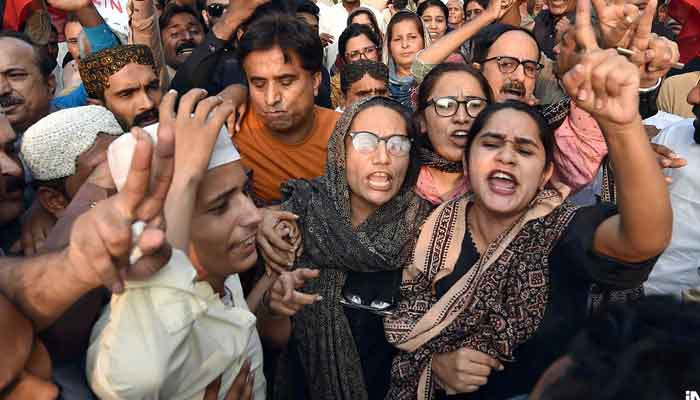Karachi protests
March was held in protest of killing of Dr Shahnawaz Kunbhar who was gunned down by Mirpurkhas police
Being a progressive in Pakistan is not easy. One is often engaged in an uphill battle to prove that they are not some kind of spy or subversive agent of the West, withstand threats of violence and actual violence from regressive elements and, all the while, deal with a state that is more interested in finding ways to shut you down then protect your rights. The nature of this struggle was on full display this past Sunday (October 13, 2024) in Karachi when protesters part of the ‘Sindh Rawadari March’ clashed with police outside the press club while resisting arrests for violating Section 144, which was imposed the previous day by the Karachi commissioner. The march was held in protest of the killing of Dr Shahnawaz Kunbhar who was gunned down by the Mirpurkhas police in a reportedly staged encounter on September 19 after being accused of blasphemy. According to social media posts, the police apparently ended up rough-handling the Rawadari March protesters, an act that has rightly been condemned across a spectrum of civil society actors. Meanwhile, a counter-protest held by the Tehreek-e-Labbaik Pakistan (TLP) also led to clashes with the police. Section 144 was imposed in the context of the Shanghai Cooperation Summit in Islamabad, which kicks off today.
The Sindh Human Rights Commission (SHRC) has found that Dr Kunbhar was wrongfully identified as a blasphemy suspect likely due to “systemic flaws in the FIR registration process”, leading to his death. One can understand why many would want to protest such blatant injustice. Section 144 can only be applied in urgent cases where there is a clear threat of danger. In this case, the threat of violence appears to have emanated from the potential of clashes between those protesting against Dr Kunbhar’s killing and the counter-protesters and the overall need to avoid such incidents given the SCO Summit.
Pakistan needs to show that it is capable of hosting large international events and cannot be held hostage by political instability. However, it often appears as though there is never a right moment for progressive voices to be heard in the country. They can be silenced in the name of avoiding violence and instability when it is other elements causing said violence and instability. Meanwhile, the country is no stranger to regressive elements simply ignoring any directions from the state when it comes to holding protests and getting off with a slap on the wrist. They also seem to enjoy a free hand when it comes to threatening others and levelling false accusations against them. All of this leads to an environment where those marching for rights and justice can be the most likely to be deprived of them. And as important as maintaining stability is, Pakistan is unlikely to make much progress if the state continues to take this lopsided approach.
-
 Extreme Cold Warning Issued As Blizzard Hits Southern Ontario Including Toronto
Extreme Cold Warning Issued As Blizzard Hits Southern Ontario Including Toronto -
 Lana Del Rey Announces New Single Co-written With Husband Jeremy Dufrene
Lana Del Rey Announces New Single Co-written With Husband Jeremy Dufrene -
 Ukraine-Russia Talks Heat Up As Zelenskyy Warns Of US Pressure Before Elections
Ukraine-Russia Talks Heat Up As Zelenskyy Warns Of US Pressure Before Elections -
 Lil Nas X Spotted Buying Used Refrigerator After Backlash Over Nude Public Meltdown
Lil Nas X Spotted Buying Used Refrigerator After Backlash Over Nude Public Meltdown -
 Caleb McLaughlin Shares His Resume For This Major Role
Caleb McLaughlin Shares His Resume For This Major Role -
 King Charles Carries With ‘dignity’ As Andrew Lets Down
King Charles Carries With ‘dignity’ As Andrew Lets Down -
 Brooklyn Beckham Covers Up More Tattoos Linked To His Family Amid Rift
Brooklyn Beckham Covers Up More Tattoos Linked To His Family Amid Rift -
 Shamed Andrew Agreed To ‘go Quietly’ If King Protects Daughters
Shamed Andrew Agreed To ‘go Quietly’ If King Protects Daughters -
 Candace Cameron Bure Says She’s Supporting Lori Loughlin After Separation From Mossimo Giannulli
Candace Cameron Bure Says She’s Supporting Lori Loughlin After Separation From Mossimo Giannulli -
 Princess Beatrice, Eugenie Are ‘not Innocent’ In Epstein Drama
Princess Beatrice, Eugenie Are ‘not Innocent’ In Epstein Drama -
 Reese Witherspoon Goes 'boss' Mode On 'Legally Blonde' Prequel
Reese Witherspoon Goes 'boss' Mode On 'Legally Blonde' Prequel -
 Chris Hemsworth And Elsa Pataky Open Up About Raising Their Three Children In Australia
Chris Hemsworth And Elsa Pataky Open Up About Raising Their Three Children In Australia -
 Record Set Straight On King Charles’ Reason For Financially Supporting Andrew And Not Harry
Record Set Straight On King Charles’ Reason For Financially Supporting Andrew And Not Harry -
 Michael Douglas Breaks Silence On Jack Nicholson's Constant Teasing
Michael Douglas Breaks Silence On Jack Nicholson's Constant Teasing -
 How Prince Edward Was ‘bullied’ By Brother Andrew Mountbatten Windsor
How Prince Edward Was ‘bullied’ By Brother Andrew Mountbatten Windsor -
 'Kryptonite' Singer Brad Arnold Loses Battle With Cancer
'Kryptonite' Singer Brad Arnold Loses Battle With Cancer




